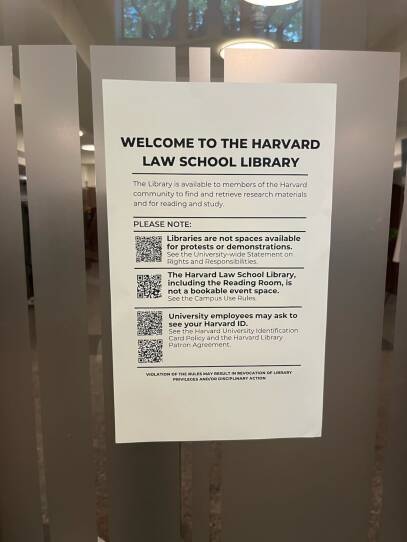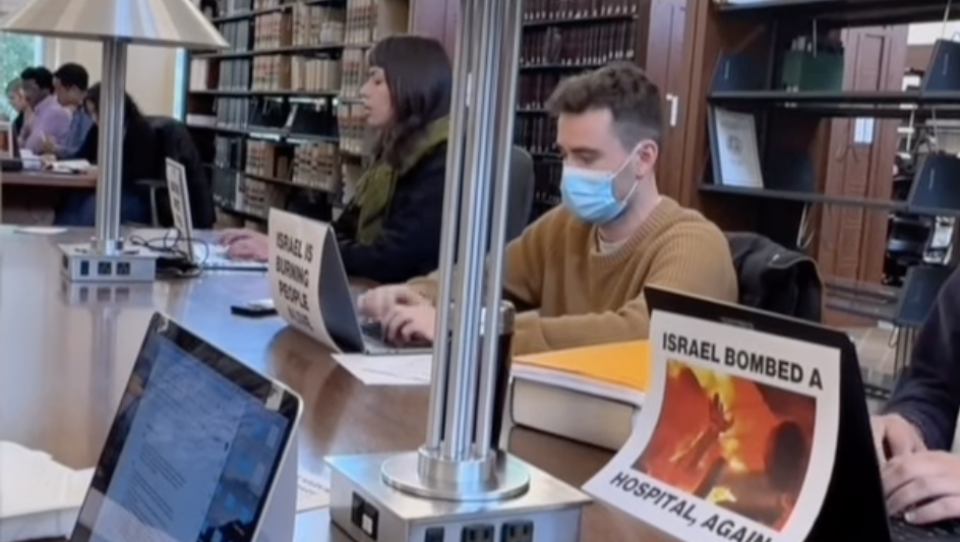At least 60 law students who participated in a “study-in” at Harvard’s Langdell Library last week have been banned from the space until Nov. 7.
It was one of several silent protests by students demanding Harvard University divests its endowment from companies that profit from Israel’s ongoing occupation of Gaza. There were prior demonstrations at Widener Library, and student groups held another action Thursday at Langdell.
The study-ins have been coordinated by student groups like Law Students for a Free Palestine, Dissent Collective, and Harvard Out of Occupied Palestine.
Micah Herskind, a second-year law student, participated in last week’s action and was suspended. He said the group sat in the reading room for about 45 minutes, many wearing keffiyehs, with paper signs taped to their computers.
“We literally just sat in the library and I worked on a cover letter. There was no disruption. There was no noise,” he said. Signs had already been posted around the library noting protests could not happen. Then staff and security began asking for IDs and information.
Irene Ameena was also there. “They asked me for my ID. I explained that this is actually pretty disruptive to me because I was trying to do my criminal procedure readings,” she said.
Herskind said it feels like the university is targeting pro-Palestine students through the library suspension and other “crackdowns.” Still, he and Ameena believe it’s important to express their dissent.
“Our university’s dollars, our tuition dollars are funding the atrocities that we’re seeing every day,” Herskind said.
“This money is going directly towards Israeli occupation, to Israeli apartheid and the ongoing genocide in Gaza,” Ameena said.

Students received emails from Amanda Watson, assistant dean for library and information services, saying that demonstrations and protests are “not permitted in Harvard’s libraries and other specified places,” according to an email obtained by GBH. It included a link to a university guidance from January.
In response to the protests, university librarian Martha Whitehead wrote an essay about why “study-ins” should not be allowed.
“We’re concerned that even when there is no noise, an assembly of people displaying signs changes a reading room from a place for individual learning and reflection to a forum for public statements,” she wrote.
Other faculty members have lined up to defend students. Christine Desan teaches at the law school about money and political economy. She recently sat reading for an hour during in a study-in at Widener, acting as a “witness” to support students, along with 30 other faculty members.
“I sat there quietly with a black scarf on and a sign quoting the Harvard Library Statement of Values to, quote, 'Embrace Diverse Perspectives propped up in front of me,'” she said.
Professor Andrew Crespo said the faculty brought a reading list that included essays by Martin Luther King Jr., Toni Morrison and Henry David Thoreau, all about the importance of dissent in a free society and the importance of resisting censorship.
“We’re trying to highlight for the university just how wrongheaded it is for a place that’s dedicated to the free exchange of ideas to start punishing its students and now its professors for sitting quietly in a library reading just because it doesn’t like that,” said Crespo. “Sharing ideas is why this place exists.”
Both professors have been suspended from visiting the library for two weeks.





